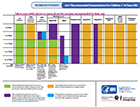11 to 12 Years

There are four vaccines recommended for preteens—these vaccines help protect your children, their friends, and their family members. While your kids should get a flu vaccine every year, the three other preteen vaccines should be given when kids are 11 to 12 years old. There are some vaccines your teen will need more than one shot of to have the best protection.
The following vaccines are recommended by the American Academy of Pediatrics (AAP), the American Academy of Family Physicians (AAFP), other medical societies, and CDC:
- Meningococcal Conjugate Vaccine
One dose of meningococcal conjugate vaccine helps protect against some of the bacteria that can cause meningococcal disease, including sepsis and meningitis. - HPV Vaccine
Human papillomavirus (HPV) vaccines help protect both girls and boys from HPV infection and cancers caused by HPV. - Tdap Vaccine
One dose of Tdap is recommended for protection against tetanus, diphtheria and pertussis (whooping cough).Recommended Vaccine Schedule

Help protect your teen’s health by getting them vaccinated according to the recommended immunization schedule.
- Flu Vaccine
Everyone 11-12 years of age and older should get a flu vaccine every year.
Vaccine Benefits
The vaccines recommended for preteens can prevent very serious diseases like meningitis and HPV cancers. Even illnesses like pertussis (whopping cough) or the flu can be unpredictable and could cause a preteen to get very sick and possibly miss weeks of school and other activities. You can help protect your preteen from these vaccine-preventable diseases by getting the vaccines recommend for them when they are 11 or 12 years old.
Find out what vaccines your child needs and when with the adolescent immunization schedule.
Vaccine Risks
Preteens, like people of any age, may experience mild side effects from vaccination. The most common side effects are redness and soreness at the spot where they get the shot in the arm. Some people, including preteens, might faint after getting a shot. Sometimes people fall when they faint and that could cause an injury. Staying seated and being observed for a few minutes after receiving a shot can help. Preteens should not receive any vaccine that contains something that they are allergic to. Be sure to let the doctor or nurse know about any allergies your preteen may have.
- Page last reviewed: April 15, 2016
- Page last updated: February 15, 2017
- Content source:


 ShareCompartir
ShareCompartir